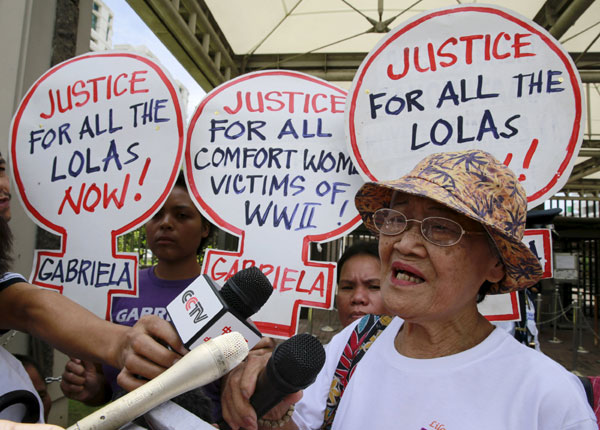Abe shies away from direct apology
By CAI HONG/ZHANG YUNBI/ZHAO YANRONG (China Daily) Updated: 2015-08-15 07:33
 |
|
Filipina "comfort woman" Estelita Dy, 89, demands in Manila on Friday an apology from Japan for the treatment of women who were forced to work in brothels during the war. ROMEO RANOCO/REUTERS |
Yang Bojiang, deputy director of the Chinese Academy of Social Sciences' Institute of Japan Studies, said that given Abe's revisionist outlook on history, Friday's statement "could be interpreted as a sort of concession" to Japan's pacifists.
Yang added that Abe's speech "is a step backward, indeed" compared with the Murayama Statement delivered by former Japanese Prime Minister Tomiichi Murayama on the 50th anniversary of the end of the war in 1995.
Debate was prompted by Abe's remark that "we must not let our children, grandchildren and even further generations to come, who have nothing to do with that war, be predestined to apologize."
Abe also said that "nearly 3,000 Japanese children left behind in China were able to grow up there and set foot on the soil of their homeland again".
"Abe is trying to look friendly in order to improve Japan's relationship with China by making such a remark," Yang commented.
During the war, Japan forced Asian women into sexual slavery to please the Imperial Japanese Army. However, Abe avoided using the widely known euphemism "comfort women" by stating that "the dignity and honor of many women were severely injured during wars in the 20th century".
Wilson Lee Flores, a columnist at the Philippine Star and a college professor, said the statement "seemed like a public relations speech" and "Japan's future is uncertain because Abe is pushing to change its peaceful Constitution even though over half the population disagrees with him".
"I believe the world, and Asia's victimized countries, should judge Japanese leaders by their sincere actions-like correcting wrong museum stories, revising wrong history textbook accounts, issuing an official government apology and by paying 'comfort women'," he said.
Contact the writers through zhangyunbi@chinadaily.com.cn
- Abe's watered-down apology fails sincerity test
- Japan's Abe offers no fresh apology for past aggression, colonial rule
- Abe should apologize for Japan's wartime crimes in WWII speech
- Abe's stance on past to decide Japan's future
- Abe statement to be touchstone for S. Korea-Japan ties: S. Korean FM
- Crafty rhetoric, insincere politics




